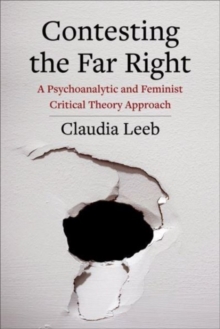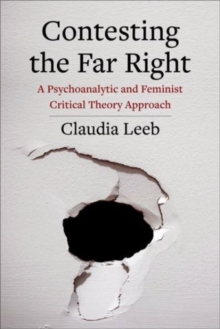
Pathologies of Reason : On the Legacy of Critical Theory Hardback
by Axel Honneth
Part of the New Directions in Critical Theory series
Hardback
Description
Axel Honneth has been instrumental in advancing the work of the Frankfurt School of critical theorists, rebuilding their effort to combine radical social and political analysis with rigorous philosophical inquiry.
These eleven essays published over the past five years reclaim the relevant themes of the Frankfurt School, which counted Theodor W.
Adorno, Max Horkheimer, Walter Benjamin, Jurgen Habermas, Franz Neumann, and Albrecht Wellmer as members.
They also engage with Kant, Freud, Alexander Mitscherlich, and Michael Walzer, whose work on morality, history, democracy, and individuality intersects with the Frankfurt School's core concerns. Collected here for the first time in English, Honneth's essays pursue the unifying themes and theses that support the methodologies and thematics of critical social theory, and they address the possibilities of continuing this tradition through radically changed theoretical and social conditions.
According to Honneth, there is a unity that underlies critical theory's multiple approaches: the way in which reason is both distorted and furthered in contemporary capitalist society. And while much is dead in the social and psychological doctrines of critical social theory, its central inquiries remain vitally relevant.
Is social progress still possible after the horrors of the twentieth century?
Does capitalism deform reason and, if so, in what respects?
Can we justify the relationship between law and violence in secular terms, or is it inextricably bound to divine justice?
How can we be free when we're subject to socialization in a highly complex and in many respects unfree society?
For Honneth, suffering and moral struggle are departure points for a new "reconstructive" form of social criticism, one that is based solidly in the empirically grounded, interdisciplinary approach of the Frankfurt School.
Information
-
Available to Order - This title is available to order, with delivery expected within 2 weeks
- Format:Hardback
- Pages:236 pages
- Publisher:Columbia University Press
- Publication Date:05/05/2009
- Category:
- ISBN:9780231146265
Other Formats
- Paperback / softback from £18.85
Information
-
Available to Order - This title is available to order, with delivery expected within 2 weeks
- Format:Hardback
- Pages:236 pages
- Publisher:Columbia University Press
- Publication Date:05/05/2009
- Category:
- ISBN:9780231146265










